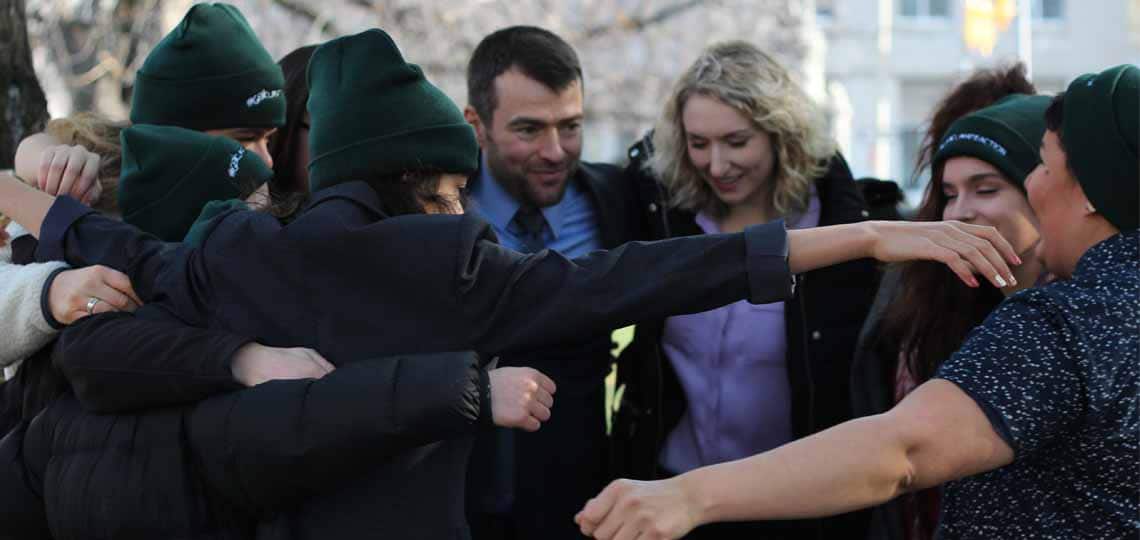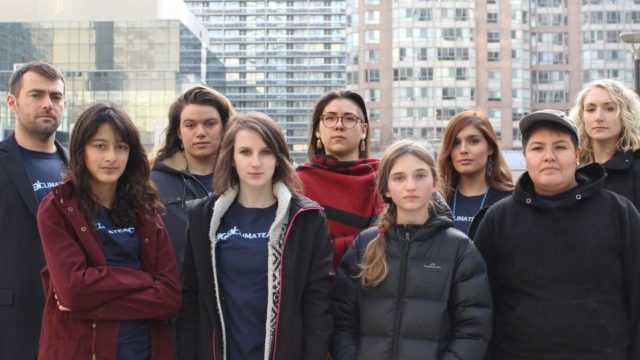As many of you have likely read (and watched), seven young people, backed by Ecojustice, launched a lawsuit against the Government of Ontario for weakening its climate targets.
You might recall that when the Doug Ford government came into office, it passed the Cap and Trade Cancellation Act, 2018 — a move we swiftly (and successfully) challenged on the basis that the Ford government ignored public consultation requirements under Ontario’s Environmental Bill of Rights.
While our case vindicated Ontarians’ right to be consulted on changes to environmental law, it did not reverse the Cap and Trade Cancellation Act, which rolled back the province’s relatively progressive climate targets, replacing them with a significantly weaker 2030 target.
A weaker target means the Government of Ontario will allow more climate change-inducing greenhouse gas emissions to be put into the atmosphere, threatening the health of Ontarians and breaching their Charter right to life, liberty, and security of their person.
Ontario’s backpedaling comes at a time when there is a clear scientific consensus and moral imperative for governments to ratchet up their targets to limit warming to 1.5 degrees Celsius.
At time when we must do more to combat the climate emergency, the Government of Ontario has decided to do less. This is unacceptable, as the seven climate leaders at the heart of our latest case assert, unconstitutional.
Since this case launched, we’ve received an overwhelming number of supportive and encouraging messages from people like you. We’ve also been flooded with a number of questions we want to make sure are answered.
What is this case about?
We are taking Premier Doug Ford to court for weakening Ontario’s 2030 climate target and violating Ontarians’ Charter rights to life, liberty, and security of the person.
At a time when the science says we should be showing greater climate ambition, the Ford government has thrown climate action in this province into reverse. Our seven clients are going to court to get us back on track.
They are part of what we affectionately call Generation Climate Action (#GenClimateAction) — the remarkable young people around the world who have left their classrooms, put their plans on hold, and taken to the courts to speak truth to power about how the climate crisis impacts their future.
Can you explain the lawsuit a bit more?
By weakening its 2030 targets, the Ontario government will be allowing more greenhouse gas emissions in the province, further contributing to the climate emergency.
Young people are especially at risk, because climate threats will increase over the next decades, meaning people like our clients will bear the costs of the climate emergency, including widespread illness and death, more than previous generations.
It’s time our governments — at all levels — start doing their part to address the climate emergency, including by setting and legislating targets to limit global warming to 1.5 degrees Celsius, and holding politicians to account for meeting those targets.
What outcome are you hoping for?
To put it simply: Ontario’s 2030 target is inadequate and unconstitutional. We want to see it struck down and for the court to order the Government of Ontario to set a stronger target that is in line with what the science tells us is necessary to limit warming to 1.5 degrees Celsius.
We also hope to see the courts recognize that a safe climate and healthy environment are an integral part of our Charter right to life, liberty, and security of the person.
What does the science say?
Our applicants take the position that the Paris Agreement temperature goal of “well below two degrees” and “…pursuing efforts to keep global warming 1.5” is the minimum standard necessary to ensure there will not be mass breaches of their Charter rights.
The Intergovernmental Panel on Climate Change’s 2018 Special Report concludes that global emissions must reduce by 45 per cent of 2010 levels by 2030 to have a 50 per cent chance of limiting warming to 1.5 degrees.
Ontario’s current 2030 target (reducing emissions by 30 per cent below 2005 levels) falls well short of this global average, and therefore violates the applicants’ Charter rights and must be struck down.
As a wealthy economy within an industrialized country, Ontario must aim to do no less than this global average. This is reinforced by several factors, such as Ontario’s high per capita and historic emissions, and its economic and technical capacity to reduce emissions.
Similar legal cases are occurring all over the world right now. Why are young people taking to the courtrooms?
It’s true: we’ve seen young people around the world take to the streets and the courtrooms to demand action on climate change — and win. We need to look no further than the Netherlands and the U.S. for examples.
That’s because time is running out for them. We have just over a decade to take meaningful action, or it’s going to be much harder to avoid the most catastrophic effects.
A case like this is likely going to be an uphill battle, but with Premier Ford doing less on the climate at precisely the time he needs to be doing more, our clients have no choice but to turn to the courts to defend their futures.
Aren’t Ontario’s emissions insignificant in the global context?
Every sitting government faces a choice. They can choose to do the right thing and increase their climate ambition and protect the health, security, and well-being of their residents. Or they can ignore the science and the moral imperative for action and endanger people now, and for generations to come.
As a wealthy province in a wealthy country with some of the highest emissions in the world, and the resources to take action, Ontario has a responsibility to increase, not backtrack as Premier Ford’s done, on its climate ambition.
What’s the next stage in this lawsuit?
We are in a climate emergency which means we don’t have the time to wait. We will push this case to a hearing as quickly as possible and see no reason why this can’t be before the Courts within a year.
Is this case winnable?
It is impossible to predict the outcome of any litigation, especially right at the outset. This case will require the courts to break new ground, so we anticipate it will be an uphill struggle.
Despite these challenges, bringing these issues before the courts and into the public eye is an important step in making sure serious action is finally taken to fight climate change. This type of case won’t be an easy victory, but with the impacts of climate change becoming more and more serious and with the window of opportunity to act getting smaller and smaller, the time for this case is now.
Why focus on Ontario? What about other governments?
While this legal challenge focuses on Ontario and the actions of the Ford government, any government that is failing to address the climate emergency in a meaningful way can expect to face litigation of this nature.
Every government in Canada must do its part to respond to the climate emergency including by setting and legislating targets that are consistent with limiting global warming to 1.5 degrees and that hold politicians to account.
Who is covering the costs of this case?
Thanks to the generosity of our donors, including more than 19,000 individual Canadians from coast-to-coast-to-coast, Ecojustice represents every one of our clients — including the applicants in this case — free of charge.
This case, like all Ecojustice-backed public interest litigation, is 100 per cent funded by individuals and organizations who share our vision of a thriving environment, safe climate, and healthy communities protected by effective, well-enforced laws.
Ecojustice is actively fundraising in support of this case. Litigation is often expensive and resource-intensive, so we invite, and are grateful to accept, gifts which meet our strict criteria. We do not accept donations:
- Where the donation is given on the condition that the donor will influence Ecojustice’s strategic choices.
- Where the donor is, or likely to become, an opposing party to Ecojustice litigation.
- Where the donor is engaged in activities that conflict with Ecojustice’s mission to use the law to defend the environment.
Can I join the lawsuit as a client?
Right now, we have an incredible group of young people we are representing and are not looking to add applicants to this lawsuit.
But that doesn’t mean we don’t need your help. Here are three ways you can join our clients in their fight for their future:
This case, like all Ecojustice-backed public interest litigation, is 100 per cent funded by individuals who share our vision of a thriving environment, safe climate, and healthy communities protected by effective, well-enforced laws. By donating what you can, you help ensure that we can back this group of courageous young people every step of the way.
Sign-up to get breaking news about this case straight to your inbox. This is our biggest climate lawsuit yet — you’re not going to want to miss a beat.
Make your voice heard! For the first time ever, climate action was a top issue on the political agenda during the federal election. Make sure federal party leaders know that just because the election is over, doesn’t mean dealing with climate change is off the table.




